|
|
|
Sort Order |
|
|
|
Items / Page
|
|
|
|
|
|
|
| Srl | Item |
| 1 |
ID:
047820
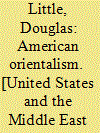

|
|
|
|
|
| Publication |
London, I. B. Tauris, 2003.
|
| Description |
xiv, 407p.
|
| Standard Number |
1860648894
|
|
|
|
|
|
|
|
|
|
|
|
Copies: C:1/I:0,R:0,Q:0
Circulation
| Accession# | Call# | Current Location | Status | Policy | Location |
| 047111 | 327.73056/LIT 047111 | Main | On Shelf | General | |
|
|
|
|
| 2 |
ID:
084003
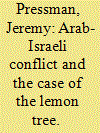

|
|
|
|
|
| Publication |
2008.
|
| Summary/Abstract |
This article uses the The Lemon Tree by Sandy Tolan (2006) to demonstrate how one type of book, a literary non-fiction book written for popular audiences, can be used in a political science course such as one on the Arab-Israeli conflict. The book concisely presents multiple Arab-Israeli perspectives and enlivens the history and infuses it with both broader and deeper meaning. After a brief summary of the plot, the article gives examples of political science themes for which the book is a useful text: nationalism and the formation of national identity; the relationship between structure and agency; and the search for objective truth. The book also suggests many broad Arab-Israeli motifs. The article explains how the book was used in the classroom, including discussions, guidance sheets, and a longer paper assignment.
|
|
|
|
|
|
|
|
|
|
|
|
|
|
|
|
| 3 |
ID:
071760
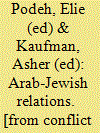

|
|
|
|
|
| Publication |
Portland, Sussex Academic Press, 2006.
|
| Description |
xiv, 386p.hbk
|
| Standard Number |
1903900689
|
|
|
|
|
|
|
|
|
|
|
|
Copies: C:1/I:0,R:0,Q:0
Circulation
| Accession# | Call# | Current Location | Status | Policy | Location |
| 051242 | 956.05/POD 051242 | Main | On Shelf | General | |
|
|
|
|
| 4 |
ID:
084594
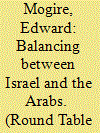

|
|
|
|
|
| Publication |
2008.
|
| Summary/Abstract |
This article attempts to illuminate Kenya-Middle East relations using a range of indicators such as trade, political-diplomatic interactions and Kenya's reaction to the Arab-Israel conflict. It examines the main factors underpinning this relationship and the form it is likely to take in the future. It shows that Kenya has strived to maintain relations with both the Arab-Islamic states and Israel. Although at the multilateral level Kenya's orientation tends to be pro-Arab, at the bilateral level it has maintained a close relationship with Israel. Kenya's foreign policy is non-alignment, support for African unity, and a radical orientation characterized by idealism as well as economic and security interests. Internal political imperatives, especially the Muslim influence, are the main factors underpinning Kenya-Middle East relations. While economic considerations will propel Kenya to strengthen its relations with Arab countries, security concerns, especially in the light of terrorist attacks, will ensure that relations with Israel will remain strong.
|
|
|
|
|
|
|
|
|
|
|
|
|
|
|
|
| 5 |
ID:
118472
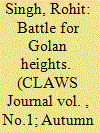

|
|
|
| 6 |
ID:
027295
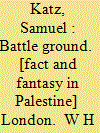

|
|
|
|
|
| Publication |
London, W H Allen, 1973.
|
| Description |
xiv, 271p.: mapshbk
|
| Standard Number |
0491012608
|
|
|
|
|
|
|
|
|
|
|
|
Copies: C:1/I:0,R:0,Q:0
Circulation
| Accession# | Call# | Current Location | Status | Policy | Location |
| 012711 | 956.04/KAT 012711 | Main | On Shelf | General | |
|
|
|
|
| 7 |
ID:
080916
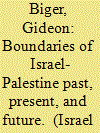

|
|
|
|
|
| Publication |
2008.
|
| Summary/Abstract |
Palestine, Eretz-Israel, Israel, Terra Santa, The Holy Land, Philistines-all those names have been given to a stretch of land situated on the eastern shore of the Mediterranean Sea. This was, and still is, one of the most important pieces of land, which the world has been dealing with during the last two thousand years. The Arab-Israeli conflict, which has run for the last hundred years, is but the last in a series of long struggles, which dictate the history of that area. One of the main issues is the delimitation of Palestine, a process that began about 100 years ago but is far from complete. Understanding this process is the aim of this essay, which will present an historical review and an analytical view concerning the actors involved in the process and an overview dealing with the three eras of boundary making of Israel
|
|
|
|
|
|
|
|
|
|
|
|
|
|
|
|
| 8 |
ID:
131459
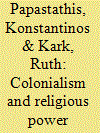

|
|
|
|
|
| Publication |
2014.
|
| Summary/Abstract |
This article critically assesses the conflict within the Orthodox Church of Jerusalem between the Greek hierarchy and the Arab laity concerning the proposals of the Mandatory Government for a new regulatory framework for patriarchal operation. The British presented two draft reform ordinances, neither of which met Arab expectations. Instead of promoting the laity's emancipation from 'foreign' Greek administrative and financial control, the ordinances left little room for a true inversion of the power structure between the two opposing camps, retaining the status quo at the expense of the Arab Orthodox rights.
|
|
|
|
|
|
|
|
|
|
|
|
|
|
|
|
| 9 |
ID:
083361
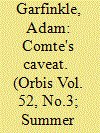

|
|
|
| 10 |
ID:
126975
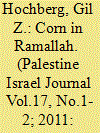

|
|
|
|
|
| Publication |
2011.
|
| Summary/Abstract |
A personal narrative is presented which explores the author's experience of having a short visit to Israel, A contemporary tale of two Israeli citizens whose friendly visit to Ramallah becomes one of Israel's latest successful rescue operations
|
|
|
|
|
|
|
|
|
|
|
|
|
|
|
|
| 11 |
ID:
077459
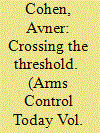

|
|
|
| 12 |
ID:
069085
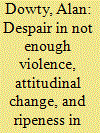

|
|
|
| 13 |
ID:
130510
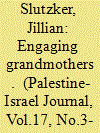

|
|
|
|
|
| Publication |
2011.
|
| Summary/Abstract |
In a small office in the West Bank town of Beit Jallah, just 10 minutes by car from Jerusalem, Tamara Rabinowitz and Siham Abu Awwad sit sipping thick Arabic coffee and finishing each other's sentences. To many in their communities they would seem a very unlikely pair of friends. Tamara, who immigrated to Israel from London in 1960, lost her son Ido in 1987 when he was serving in the Israel Defense Forces in Lebanon. Siham's brother Youssef was shot and killed by an IDF soldier at a checkpoint near their village. Her mother was a Palestinian political activist who served time in Israeli prison, along with three of Siham's brothers.
|
|
|
|
|
|
|
|
|
|
|
|
|
|
|
|
| 14 |
ID:
071399
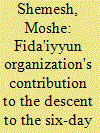

|
|
|
| 15 |
ID:
081212
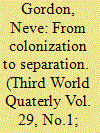

|
|
|
|
|
| Publication |
2008.
|
| Summary/Abstract |
Much has changed during Israel's 40 years of occupation of Palestinian territory. Within the past six years Israel has, on average, killed more Palestinians per year than it killed during the first 20 years of occupation. Those who help manufacture public opinion within Israel claim that the dramatic increase in Palestinian deaths results from the fact that the Palestinians have changed the methods of violence they employ against Israel, and that Israel, in turn, has also begun using more violent means. Palestinians might invert this argument, claiming that they have altered their methods of resistance in response to Israel's use of more lethal violence. While such explanations no doubt contain a grain of truth, they are symptomatic accounts, and do little to reveal the root causes underlying the processes leading to the substantial increase in human deaths. A different approach is therefore needed, one that takes into account the structural dimension of Israel's military rule and tracks the two major principles that have informed the occupation over the past four decades: the colonisation principle and the separation principle. By the colonisation principle I mean a form of government whereby the coloniser attempts to manage the lives of the colonised inhabitants while exploiting the captured territory's resources. By the separation principle I do not mean a withdrawal of Israeli power from the Occupied Territories, but rather the reorganisation of power in the territories in order to continue controlling the resources. The major difference, then, between the colonisation and the separation principles is that, under the first principle there is an effort to manage the population and its resources, even though the two are separated. With the adoption of the separation principle Israel looses all interest in the lives of the Palestinian inhabitants and focuses solely on the occupied resources. Such a reorganisation of power helps explain the change in the repertoires of violence and the dramatic increase in the number of Palestinian deaths
|
|
|
|
|
|
|
|
|
|
|
|
|
|
|
|
| 16 |
ID:
133383
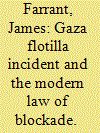

|
|
|
|
|
| Publication |
2014.
|
| Summary/Abstract |
A case study is presented concerning the May 2010 Israeli Defense Forces (IDF) boarding of a flotilla of ships attempting to breach a blockade in the Mediterranean Sea. It particularly focuses upon clashes between the IDF and the human rights activist passengers and crew of the largest ship in the flotilla, known as the "Mavi Marmara." The article discusses blockade law, the concepts of international armed conflict (IAC) and non-international armed conflict (NIAC), and whether Israel and the Islamic organization Hamas engaged in a NIAC.
|
|
|
|
|
|
|
|
|
|
|
|
|
|
|
|
| 17 |
ID:
130505
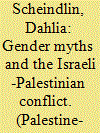

|
|
|
|
|
| Publication |
2011.
|
| Summary/Abstract |
Israeli society has distinct and complex gender roles, and the identities of both men and women are largely derived from militaristic socialization and a wartime mentality. Yet these has not been extensive systemic research comparing the attitudes of men and women toward the Israel-Palestine Conflicts.
|
|
|
|
|
|
|
|
|
|
|
|
|
|
|
|
| 18 |
ID:
050431
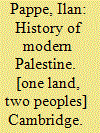

|
|
|
|
|
| Publication |
Cambridge, Cambridge University Press, 2004.
|
| Description |
xxi, 333p.pbk
|
| Standard Number |
0521556325
|
|
|
|
|
|
|
|
|
|
|
|
Copies: C:1/I:1,R:0,Q:0
Circulation
| Accession# | Call# | Current Location | Status | Policy | Location | IssuedTo | DueOn |
| 047585 | 956.94/PAP 047585 | Main | Issued | General | | RF332 | 10-Nov-2023 |
|
|
|
|
| 19 |
ID:
079755
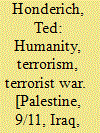

|
|
|
|
|
| Publication |
London, Continuum, 2006.
|
| Description |
206p.
|
| Standard Number |
9780826497468
|
|
|
|
|
|
|
|
|
|
|
|
Copies: C:1/I:0,R:0,Q:0
Circulation
| Accession# | Call# | Current Location | Status | Policy | Location |
| 052891 | 363.325/HON 052891 | Main | On Shelf | General | |
|
|
|
|
| 20 |
ID:
129197
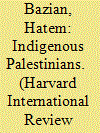

|
|
|
|
|
| Publication |
2014.
|
| Summary/Abstract |
On November 10th, 2013, the Israeli cabinet voted in a special session to authorize the demolition and removal of Umm al-Hiran, an "unauthorized," Palestinian Bedouin village in the Negev Desert, and to build in its place a new community for national Jews to be named Hiran, which had been planned and approved in early 2002. The stated reason for this demolition and forceful eviction is the lack of permits for the existing settlement, with Umm al-Hiran being one of a number of Palestinian Bedouin communities that were settled without permits and are currently subject to intense Israeli plans for removal. Umm al-Hiran itself was set-up in early 1956 by the Palestinian Abu-Alkian tribe after they had been forced to move from their ancestral tribal lands near Kibbutz Shoval in the Northern Negev.
A more critical development related to this event is the Israeli Parliament's passing of the first reading of the Prawer law. If the plan wins final approval, as it appears it will, it would cause the forceful displacement of 40,000-70,000 Arab Bedouins from the Negev, the confiscation of 800,000 dunams of Arab land, the razing to the ground of 36 or more Arab villages, and the dispossession of another generation of Palestinians. According to Adallah, the Legal Center for Arab Minority Rights in Israel, the "underlying premise of the draft bill is that there is no Bedouin land ownership," effectively negating the "population's right to property and historic affinity to the land." At the heart of this matter is the ongoing contestation of Palestinian land rights, with the Israeli government using its authority to define these policies to favor the Jewish population over the Arab. Thus, this bill, like others before it, "promotes the principle of segregation along the lines of ethnic affiliation and labeling."
|
|
|
|
|
|
|
|
|
|
|
|
|
|
|
|
|
|
|
|
|